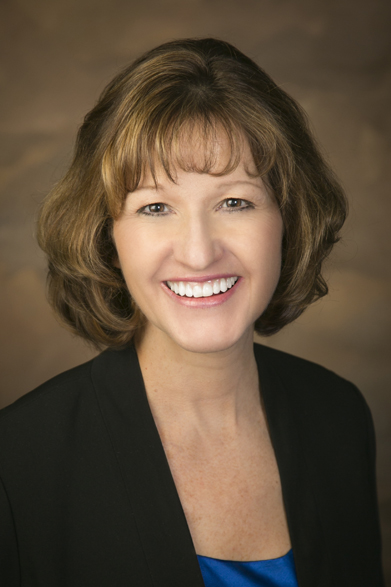- Editorial Offices
- 203 Brantly Hall
- Missoula, MT 59812
- (406) 243-2488
- themontanan@umontana.edu
About Alumni
Class Notes: Q&A with Denise Grills ’80
Denise Grills ’80 has come a long way from the days of staying overnight in UM’s Liberal Arts Building basement, waiting for her programming printouts as a business and computer science student.
Now vice president of a major technology company, Grills has spent 35 years working her way to the top of her field as manager of a global team.
Passionate about career growth, she also is a major proponent of UM’s Women’s Leadership Initiative, a yearlong leadership training and network-building program specifically focused on accelerating females into impactful careers.
Grills offers insight into the role of women in the workforce and in the community and her own career path as a leader in the field of technology.
 What was your experience as a female computer science and business major at UM?
What was your experience as a female computer science and business major at UM?
When I was at UM during 1976-80, there were female students in the business school, but definitely not in the computer science classes. I remember one class of about 80 students that included only one other woman besides me. I had to phone the professor one day, and he asked, “Are you the blonde or the brunette?” I guess it was pretty obvious we were the minority.
My struggle at that time was convincing myself that I was as smart as everyone else. I remember getting my grade back on a challenging computer science exam and realizing I had one of the top scores. It was definitely an I-can-do-this moment.
How have you been involved with the Women’s Leadership Initiative?
I serve as an adviser to WLI. I initially coached the first cohort. That first cohort of amazing women responded by focusing on their development and overcoming the many roadblocks they were encountering in their lives and careers, such as male-dominated departments and meetings. There were a couple of women who made changes in their relationships, and most gained confidence. It was so fantastic to see them blossom, and I am so proud of the accomplishments of these first cohorts and the benefits the University has received.
How was your desire to become involved impacted by your background?
Since my three sisters and I all graduated from UM and have had successful lives and careers, I definitely want to give back to the University. I owe all my success in life and my career to my family and UM. My UM education gave me the path to pursue a Master of Business Administration degree, and I met my husband of 34 years.
As a young first-generation college student, my hope was to find a good job and travel. Never did I imagine that traveling for business would enable me to see the Taj Mahal, Great Wall of China, Eiffel Tower and so many other exciting sites around the world. Not only have I been able to support my family, but now am able to help others in return.
As a manager for over 20 years, I have worked with my staff to help them to be successful and balance work-life. Many of my former employees come back to me for mentoring, and it is one of the most enjoyable things I do. I hope I can help the WLI cohort through many of the stumbling blocks I have encountered and give them encouragement and the skills to keep going.
What were some of these stumbling blocks?
I wish I would have reached out to ask for what I wanted. Mid-career, I worked with men who saw women as hourly employees. They would just ignore and talk over us. I’ve seen my share of sexual harassment. It’s stressful. It takes a lot out of you to go through that.
What is the importance of initiatives to accelerate women in learning environments like UM?
Women have certainly moved up, but at the time WLI was founded by President Engstrom, women were not in top leadership positions at the University. Focusing on improving leadership at the University, and specifically for the 12 women in the cohort, was a brilliant way to make progress.
The women of the first cohort have leapt forward in their careers and lives. They are leaders in the University and community, have made academic progress and, in some cases, made significant changes in their personal lives. Cohort members moved into new leadership roles, participated in the strategic initiatives for UM and served on the search committee for the new president. I am very proud of each one of them. All they needed was confidence that came to them through developing new skills, networking and believing in their abilities. They are all superstars or they wouldn’t have been selected, and they exceeded in ways we didn’t imagine.
What about accelerating women in workplaces?
I work for a company with a very strong female leadership team and a women’s leadership program that supports women in the workplace in all aspects. Support at this level is invaluable, particularly in enabling growth in young employees.
However, treatment of women in the workplace still needs improvement. Women I coach have had unfavorable experiences at companies where they’ve interviewed and at work. Fortunately, they have the strength and backing to speak up and get their issues addressed, but not without significant stress. Many women are in jobs where they feel they don’t have power and could lose their income, health benefits, along with the ability to support their families.
It’s up to each person to plan their own career. As women, particularly if we were the top students, fast-tracked early in our career, we wait for the “tap on the shoulder” to move to the next step in our career. At some point, you need to develop and state your goals to management. Then ask your management to be very clear on what you need to do to get your promotion, new role or whatever you have defined. There are many people who want to move up and, if you aren’t asking, the people who are asking will move ahead of you.
What is your advice to females who may be in the minority in their career field?
There is still an imbalance of women to men in the workplace, but, as always, do the best job you can, don’t be afraid to ask for what you want and if you are being treated unfairly, or see someone else treated unfairly, speak up. I am encouraged by one young woman who told me that a young man at her company observed some questionable behavior and went to HR with his concerns. We are definitely moving forward in the advancement and treatment of everyone in the workplace regardless of gender.
1960s
1970s
1980s
1990s
2000s
2010s
Keep us posted! Send your news to the University of Montana Alumni Association, Brantly Hall, Missoula, MT 59812. Go to www.grizalum.com and click on “Submit a Class Note,” email alumni@umontana.edu, or call 1-877-UM-ALUMS (877-862-5867). Material in this issue reached our office by Aug. 9, 2019.

